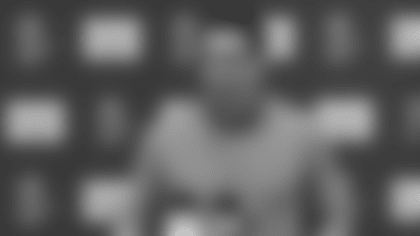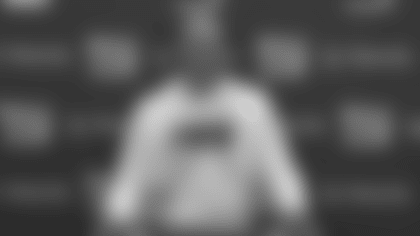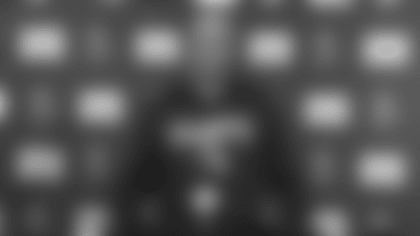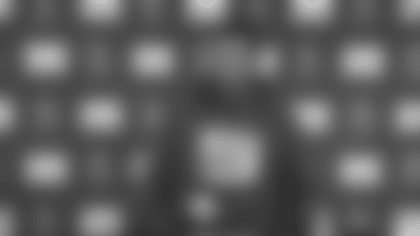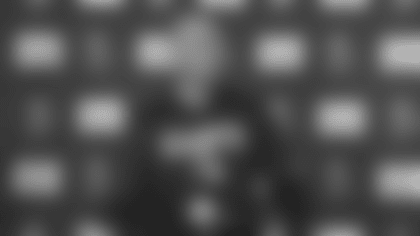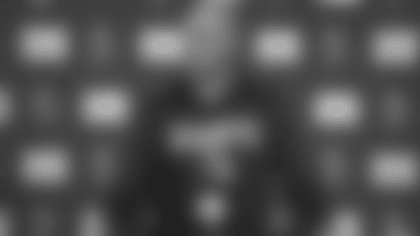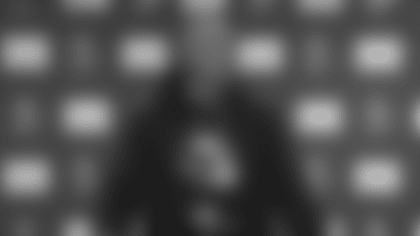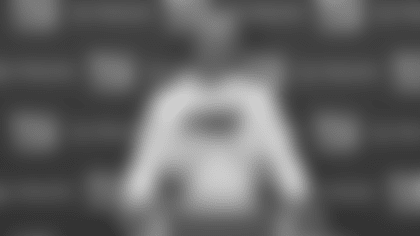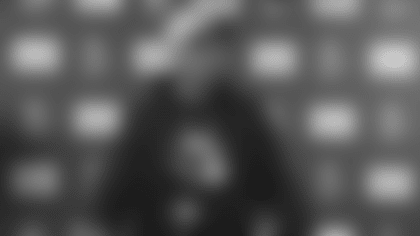Head Coach Brian Daboll
Daboll: How's everybody doing today? Good. So, we're on day three. Two good days of work, lot of competition, good tempo. Look forward to going out there today. Another, I'd say, important situation where it's a little bit third and longer. So, there will be a lot of different looks to deal with. Put the guys in some stressful spots, particularly the offense and try to have a good day?
Q: Do you have any more Yung Joka songs during warmup?
A: Could be. Yeah. Could be.
Q: Why did you do that?
A: Oh, we did it in the spring too. We play a bunch of music, and it was one of the songs. He'd send me songs here and there throughout the offseason. I'd ask him for some songs, and some I'd like better than others. And uh, talented guy.
Q: Brian, I'm kind of curious. Do you have a rhyme or reason for how you're structuring these practices? You know the short yardage, the red zone, or the third and medium henceforth.
A: Yeah, observant. Well, it's areas you need to work on. Red zone is a really important area in terms of scoring the football and then stopping and creating field goals. An area we definitely need to work on. It also helps players coming back from being down 30, 40 days of working in the offseason. And you're not running 20 go routes or covering posts or deep crossers and things like that. And then usually on like a third and two-to-five day, it's a lot shorter routes, too. You're running routes at the sticks or you're running shallow crossers, things like that. So, some of the running in the ramp up period helps those guys. Today it'll be a little bit longer. Again, trying to put players in stressful situations in practice is important. That's why you practice. You learn from it, and you move on. You see if you can fix the things you need to fix. So that's kind of what we're doing. I'd say the next day is kind of the fringe area – in that area – and then we got a day off. Then we'll start with pads. That will be a first and second down day where we can kind of get after it in the running game, and really start playing real football, if you will.
Q: Brian, you had the offense or defense running some sprints in the middle of practice yesterday. What was that about?
A: So, it wasn't anything like they made a mistake or did anything like that. I think that you need to be at your best when you're tired. A lot of games come down to the fourth quarter in this league, and when you're tired, maybe you're not concentrating or focusing as much as you need to. Kind of short sprints there, put them right back on the line of scrimmage, call a play quick, get them lined up, make sure they know who's in the game. And everybody's operating when they're tired. It's not like it was 40 sprints or anything like that, but still a short, quick sprint to get their wind up a little bit and get them out there to play and operate and execute a play.
Q: Is it almost like simulating if you have a 40-yard play downfield where they need to run down and get lined up for the next play?
A: Yeah, and we'll do that too once we start moving the ball and actually start getting into first and second (downs). Right now, it's just situational football where were just calling it and playing the game. We'll do that. But I just always thought – and I talked to some really good coaches in the offseason to try to improve myself, ask a lot of questions – if you run sprints at the end of practice and you come up and you break it down, and there's nothing else going on after that. So, we're doing a little bit of that before the practice ends and then putting them in a situation, whether it be the last play on the goal line, a big fourth down, 17 seconds left at the 18-yard-line in the red zone. And try to have them do it when they're tired. I think that's important.
Q: Out of curiosity, who's brain did you pick in the off season?
A: I keep that private. I try to do it every year out of respect to the people. I'd say some very successful people. And not just football coaches – basketball coaches, businesspeople. I think that, you know, you're always trying to learn and grow and be better. And whether it's leadership or practice scheduling. I try to take bits and pieces, make sure you're yourself. But there's so much to learn particularly for a first year like me. When I was a coordinator, I did it with successful play-callers. When I was a position coach, I did it. I just try to self-evaluate and improve each year.
Q: Brian, you had the players call some of the plays yesterday or the last couple of plays?
A: I think signal callers (Safety Xavier McKinney) X and (Quarterback) Daniel (Jones), they're relaying plays in at times to the players. Just put them on the other end of it, I think there's some friendly competition fire there and the guys get a kick out of it. There was a lot of energy there at the end of practice. I asked X this morning if he liked his play call, and Daniel too, and usually you like it when it works, and you don't when it doesn't. But X was pretty firm on his call. We'll do that as well. We'll have the walkie talkies or headsets out there for our players and there will be times – and I did it in the spring – where I will purposely cut them off on (Defensive Coordinator) Wink (Martindale) and (Offensive Coordinator Mike) Kafta because it could happen in a game like that and now they have to take control and be able to operate and not panic and all the hand gestures. Just go out and make sure you have a play all in mind and be able to lead the team.
Q: Coach, (Wide Receiver) Wan'dale (Robinson) went down yesterday. Is he okay?
A: Yeah, he's good. He was cheering at the end of practice there. I was getting on him this morning, I love how he was cheering but I said, 'Hey I thought you were down'. He said, 'I'm good.'
Q: It seems like the defensive backs were pretty upset with the refs on the last call.
A: I just try to tell these guys to not worry about the refs. They've got a job to do. It's hard enough when one side wins one time. That's the competitive nature that you try to build within your team. Within the groups, within the players. And we'll continue to try to build that.
Q: (Wide Receiver) Darius Slayton – why does he work so sparingly?
A: Yeah, well (Wide Receiver) Kadarius (Toney) has been back. I have confidence in Slay. We all saw he had a couple of drops out there, but hat's that practice is for. But again, we're in the second day. A lot of mistakes that will be made – some physical, some mental. And that's why you have coaches. You have so many coaches on a football team. Coaching is technique and fundamentals and figuring out reasons why. It's easy to come back – a player comes back – and you say, 'You need to block this guy, or you need to catch the ball," but find out the details, coach it up. He's worked real hard, and he'll continue to work. And he'll get reps throughout camp. You know, we're working with the guys – you know Wan'Dale and KT right now – and (Wide Receiver) Kenny (Golladay) with that first group. How that goes? We're in day two.
Q: Do you find that he's responding better from a mental standpoint after drops?
A: Yeah, he's – that's part of coaching as well. Not just telling a guy what route to run or what adjustment to make. It's getting to know the person and what makes them tick, too. How do they respond to negative criticism? How do they respond to positive criticism? Each player is different because they're different people. And you better figure out what makes them tick, each person. You've going to have ups and downs. Everybody reacts – you, me, my kid – everybody reacts different. My oldest kid reacts different from my youngest kid. And if you don't know that, and you treat them all the same, I think you're doing them a disservice. Darius is in a good spot. Again, there's, dropping a ball and throwing a bad pass, that's so easy for everybody to see and it's right there in the open. But how you respond, and I believe right there at the end, we had a call it period when he came down and ran a little shallow, and Daniel scrambled out and he made a big play. So being able to respond to that is important.
Q: Brian, you tell us that drops are part of practice? But do you have to tell the players? Certain guys are more fragile than others. So do you have to tell the players, 'Hey relax, it's part of practice?'
A: I think each player is different, too. Some people, I might not say one word to them. Some people, I'll say, 'Keep your head up." Other people, I'll say – I don't want to say it right now. Again, it's different. The way you treat people…they're not just out there as robots as players, the way you treat people is important. And you better figure out what makes them go. I mean it's a production business. We all got it. Nobody wants to drop a ball. Nobody wants to throw a bad pass. Nobody wants to miss a block. But it's going to happen. The last time I've seen a perfect game played in football is really, well, I haven't. How you respond to bad things is just as important as how you respond to good things.
Q: Kadarius … after a late play. Did you want the ball out quicker from Daniel there, or is that something the receivers did?
A: No, I think. The play with… I'm animated a lot. I know you guys, I mean, there's music, and you can't know what I'm saying. Sometimes we got to do a good job of keeping guys off the ground too and not grabbing jerseys. Both sides. whether it's offensive lineman grabbing, we got to make sure we're playing smart.
Q: There was a guy after practice who needed some medical attention. Who was it and is he okay?
A: He is okay. I'll tell you, there were a couple guys. We'll probably have a few guys down today relative to heat and hydration and just to be smart on that end, but he's good. It was Felice. (Offensive Lineman) Jon Feliciano.
Q: With Kadarius, what have you learned about him over the seven or eight months?
A: He's a good person. He cares about his teammates. And we have good communication, him and I. He likes football. He likes music. I think he's a very loyal, a loyal guy. And you got to build trust with KT. And he had to build trust with me. Really no different than a lot of guys. Trust is probably one of the most important things in any relationship you can build. I've told you from day one, I've been very happy with KT, his approach, how he is as a person, first and foremost, because that's what matters to me. We've seen him in college. We evaluated him. He has a tremendous skillset. He's smart. We move him around quite a bit. He's a good young player that we're going to help develop anyway we can both on and off the field.
Q: Brian, did you have any experience with the Guardian Caps at Buffalo, and what do you like about them here?
A: Yeah. Anything that can prevent injury or help prevent injury or reduce the risk of injury for players, I'm all for. Health and safety for the players is our first priority as an organization – making sure these guys are as healthy as they can be and as safe as they can be. Whatever the doctors and the trainers and the statistics say, if it's going to help the players, I'm all for it.
Q: Is it a player decision?
A: No, all the league is wearing them relative to the positions.
WR Kadarius Toney
Q: Walk us around the play and what you were thinking?
A: It was a conversion route that turned into a fade. It was really all about natural ability, and I went up and made a play, and that's the mindset.
Q: What was more fun – making the play or seeing the reaction of the guys around you after the play?
A: Really the reaction. The play is going to be the play regardless. You can make the play a million times and it's going to be the same every time you see it, you see the ball down there. Daniel (Jones), everybody. The whole team was down there. It was great comradery.
Q: Your head coach ran down the field.
A: Oh yeah, he told me was tired after that.
Q: In that moment, did you realize how big of a deal that was going to be? Socially or in general?
A: No, not at the moment. I was just focused, all locked in because you know there's a lot of speculation, I guess you could say. I'm just ready to show what I can do.
Q: You've had some time to try to reflect on your rookie year. What do you think when you look back on it?
A: Nothing pretty much, I'm just thinking about today.
Q: What does it mean to you that coach is incorporating some of your music into the practices?
A: I would say I think that's pretty great; I'm not going to lie. I need to focus right now. I'm focused on ball right now.
Q: Did you know that song was coming?
A: No, I didn't. It just kind of surprised me. It had me juiced up. I appreciate them doing for doing it because it shows the willingness to build a relationship with me.
Q: How important is that to you? The relationship?
A: I really feel like that's important with anybody, not just me - throughout the whole team. I try to have a better relationship with Daniel. I try to have a better relationship with Kenny (Golladay). Everybody around because it's a team thing, not an individual thing.
Q: Was it hard to build that relationship last year when you were off to the side?
A: No, not really. You always around the guys 24/7 anyways. I feel like the relationship was always there. The availability probably wasn't there.
Q: When you say a lot of speculation earlier, what do you mean by that from your perspective?
A: Reporting, I guess you could say.
Q: Just about how you would rebound from last year is what you are saying?
A: I guess.
Q: About how you would perform?
A: Yeah.
Q: How would you react to the fact that they were making calls looking to possibly trade you in the spring?
A: I never reacted. I talked to the people that are in the building, so I never really questioned it or anything.
Q: What have you done differently with your training? Obviously coming out of college, getting ready for the draft you have to train one way for the combine and everything. How have you changed up your training from last year to this year?
A: I feel like I'm more confident, it's just all about experience. Last year, I was just a rookie coming in kind of young and getting to learn everything. This year, second year, so I had experience on the field, had my ups and downs and I'm just here to be who I am.
Q: Do you still feel like a rookie? This is kind of a new system so you're starting over from scratch.
A: Not really. I guess it's just a mentality, but I feel good.
Q: The procedure you had, was that related to an injury from last season or was that something that popped up in the offseason during training?
A: I really can't answer that right now. You're going to have to ask (Head Coach Brian) Daboll about that.
Q: Your decision to not show for the start of the offseason program, how did you make that decision?
A: It was for personal reasons. I don't think I really have to explain that.
Q: What did you do different this offseason to train and get ready for camp? Did you do anything different in terms of your offseason work?
A: Not really. I kind of just worked on what I have to do. As far as receiver work – catching. I'm not able to be physically available, I was still mentally available.
Q: This is a whole new offense. A whole new offensive group as far as the coaching staff. What do you like about it, and what do you think it can help you do this year?
A: I feel like it's a lot of energy they brought into the building. A lot of flexibility, I guess you could say. It's more open. I really enjoy it.
Q: What do you mean by that? Flexibility and more open?
A: With route-running and stuff like that, it's not as pen and paper
Q: You have more freedom?
A: Yeah, instead of just running it technical (routes). It gives a chance to win instead of having to do it a certain way every time. It's all about chemistry with Danny, too. The coaches can only draw up the plays, we have to execute it at the end of the day.
Q: More communication too in the offense going on than in the past?
A: Oh yeah, there's a lot of communicating, but everything requires communication in the offense. What position are you playing with this and that. Just all the mental things.
Q: Especially with the pre-snap motion, I have to imagine there's a lot more talking and knowing what the guy next to you is doing.
A: Yeah, it takes a lot of communication. Especially knowing who you are running routes off of, what you are looking for when you look when you look at the defense and stuff like that.
Q: You look like you're just having a good time out there, just having fun. Does it feel that way or is it just my imagination?
A: No, it definitely is a lot of fun out there. A lot of juice, a lot of energy. I like that they came here honestly.
Q: Now that you're fully healthy, you really like this offense – what are your personal expectations for yourself this year?
A: I don't really set goals, but I just do whatever I can to help the team, in whatever way I can.
Q: When people think of last year, they think of the Dallas game when you had 10 catches and a monstrous amount of yards. Do you think of that as, 'I can do that every game,' or is that kind of going the best that it can be?
A: That's the mindset, to do it every game. I wasn't probably available last year to do it every game. It's just all about the approach.
Q: On that great pass that Aaron Robinson was guarding you, what did he say to you?
A: We're locker neighbors now. We were talking to trash about it. At the end of the day it was a good rep by him and good rep by me. It's all about lifting each other up at the end of the day.
Q: In retrospect, how do you look back on your rookie season? What do you think?
A: It's something to build off of.
S Xavier McKinney
Q: How did you like being the defensive coordinator for a play or two?
A: It was cool. I could have called a better defense, but I called what I called, and things happen. But it was fun, though.
Q: Did you know that was going to happen?
A: Yeah, we did it before in OTAs. We've done it a couple times kind of just where it's a competition thing between me and (Quarterback Daniel Jones) DJ. We'll be able to call basically the whole period for the defense and him for the offense. It's fun doing it. It's a competitive moment. Obviously, we're both trying to win so we are both trying to call the best play for us to succeed.
Q: Even though this is a new defensive system, you look really comfortable in it. Am I seeing things or am I accurate? If so, what is it about this defense that just kind of fits and you're comfortable?
A: I am definitely still learning it, but I definitely feel a lot more comfortable because I'm able to kind of do everything. That's kind of been my main focus for a couple years now. Like I said, I'm still a little bit rusty. I'm still learning through some things. It's definitely been fun being able to be everywhere on the field. It's something I always like doing.
Q: You mentioned you're still learning it. Having gone through the install during OTAs and then starting to get things at step one during training camp, does that help to reinforce that?
A: Yeah, it does. I think as far as the plays go, obviously I've got that down because we went over it a couple times now. But it's about being in different positions and seeing how you can disguise different looks and kind of throw off the offense a little bit. When I say learning it, that's what I mean by that. So, I try to go back and look at what the Ravens did in the past, how their players did it. I actually talked to (Former Ravens Safety) Eric Weddle a couple times during the offseason. He helped me a lot actually with just kind of how to disguise certain things and how to be on the same page with (Defensive Coordinator) Wink (Martindale), and things like that. We had good convo. He really helped me out in terms of looking at film, studying film, how he did it when he had Wink, so he was really helpful. That's what I mean by still trying to learn it and get stuff down pat.
Q: So more of a selling it than execution?
A: Yeah, more selling it.
Q: How did you like being the defensive coordinator for a play or two?
A: It was cool. I could have called a better defense, but I called what I called, and things happen. But it was fun, though.
Q: Did you know that was going to happen?
A: Yeah, we did it before in OTAs. We've done it a couple times kind of just where it's a competition thing between me and (Quarterback Daniel Jones) DJ. We'll be able to call basically the whole period for the defense and him for the offense. It's fun doing it. It's a competitive moment. Obviously, we're both trying to win so we are both trying to call the best play for us to succeed.
Q: Even though this is a new defensive system, you look really comfortable in it. Am I seeing things or am I accurate? If so, what is it about this defense that just kind of fits and you're comfortable?
A: I am definitely still learning it, but I definitely feel a lot more comfortable because I'm able to kind of do everything. That's kind of been my main focus for a couple years now. Like I said, I'm still a little bit rusty. I'm still learning through some things. It's definitely been fun being able to be everywhere on the field. It's something I always like doing.
Q: You mentioned you're still learning it. Having gone through the install during OTAs and then starting to get things at step one during training camp, does that help to reinforce that?
A: Yeah, it does. I think as far as the plays go, obviously I've got that down because we went over it a couple times now. But it's about being in different positions and seeing how you can disguise different looks and kind of throw off the offense a little bit. When I say learning it, that's what I mean by that. So, I try to go back and look at what the Ravens did in the past, how their players did it. I actually talked to (Former Ravens Safety) Eric Weddle a couple times during the offseason. He helped me a lot actually with just kind of how to disguise certain things and how to be on the same page with (Defensive Coordinator) Wink (Martindale), and things like that. We had good convo. He really helped me out in terms of looking at film, studying film, how he did it when he had Wink, so he was really helpful. That's what I mean by still trying to learn it and get stuff down pat.
Q: So more of a selling it than execution?
A: Yeah, more selling it.
Q: How did you get hooked up with Weddle?
A: Wink actually.
Q: He said, 'Hey you should talk to this guy.'?
A: Yeah, so we were talking about it a little bit during OTAs. We kind of went back and forth about it. Then he actually gave me Weddle's number. Then we talked, and then we scheduled a couple phone calls, got on a call, kind of went through some things, went through some film stuff. I asked him some questions. He just gave me some tips about a lot of different things. It was really helpful, and I enjoyed getting that experience from him.
Q: So, you did film stuff with him remotely? He was on, and you were on, and you could see what he was seeing?
A: Yeah, we just got on phone calls. We didn't really get on – we didn't watch film film. But I mean it's easy for us to visualize what we're both kind of talking about. A guy like that, obviously, he's a special player. It was easy for him to explain it to me where I can understand it.
Q: Did he give you any good insight into Wink other than just the X's and O's?
A: Yeah, he did. He gave me a lot of good insight. He definitely helped me. Just being in OTAs, obviously, I was the play-caller and he was the play-caller all the time, so he definitely helped me with being able to communicate it the right way and being on the same page with Wink. He kind of just let me know that Wink is an open book, and he's definitely a player's coach – somebody that's going to listen.
Q: You said the play-caller, I see the green dot. Are you getting the signals, or is it (Linebacker) Blake (Martinez) or one of the linebackers?
A: Right now, I'm getting the signals. Like I said, it's a process. Obviously, it's a little different, but I did it in in OTAs, so I'm pretty much used to it now. But yeah, I'm getting the plays around.
Q: Is it unusual for a safety and not the middle linebacker to do that?
A: I mean I guess for me because the last two years it has been the backer. Obviously for me it's different. I talked to Wink and it's not something that's new to me. I've done it before – I did it at 'Bama. It's not something that's surprising or it's not something that's too hard. It's different when you've got grown men in the huddle and you're trying to get the call to everybody. Obviously being on the backend of it, you might have to run 30-yards and run back to get the play to everybody. It's not too unusual to me.
Q: How's your voice projection?
A: (Laughs) Yeah, you've definitely got to say it with your chest, but it's not too bad. I think once everybody got used to my voice – just hearing it – they got used to being able to get the whole call. Obviously, we've had some hiccups here and there because it was new to everybody, but I think we're good now. I'm making sure I'm still getting it to the backers, and they'll get it to the front. We're working through it, obviously. Not too bad.
Q: Do you see yourself being a coach down the line once your career is done?
A: That's a tough question. I can't answer it right now, but obviously, I want to still be in the realm of working in the football space. : Yeah, more selling it.
Q: How did you get hooked up with Weddle?
A: Wink actually.
Q: He said, 'Hey you should talk to this guy.'?
A: Yeah, so we were talking about it a little bit during OTAs. We kind of went back and forth about it. Then he actually gave me Weddle's number. Then we talked, and then we scheduled a couple phone calls, got on a call, kind of went through some things, went through some film stuff. I asked him some questions. He just gave me some tips about a lot of different things. It was really helpful, and I enjoyed getting that experience from him.
Q: So, you did film stuff with him remotely? He was on, and you were on, and you could see what he was seeing?
A: Yeah, we just got on phone calls. We didn't really get on – we didn't watch film film. But I mean it's easy for us to visualize what we're both kind of talking about. A guy like that, obviously, he's a special player. It was easy for him to explain it to me where I can understand it.
Q: Did he give you any good insight into Wink other than just the X's and O's?
A: Yeah, he did. He gave me a lot of good insight. He definitely helped me. Just being in OTAs, obviously, I was the play-caller and he was the play-caller all the time, so he definitely helped me with being able to communicate it the right way and being on the same page with Wink. He kind of just let me know that Wink is an open book, and he's definitely a player's coach – somebody that's going to listen.
Q: You said the play-caller, I see the green dot. Are you getting the signals, or is it (Linebacker) Blake (Martinez) or one of the linebackers?
A: Right now, I'm getting the signals. Like I said, it's a process. Obviously, it's a little different, but I did it in in OTAs, so I'm pretty much used to it now. But yeah, I'm getting the plays around.
Q: Is it unusual for a safety and not the middle linebacker to do that?
A: I mean I guess for me because the last two years it has been the backer. Obviously for me it's different. I talked to Wink and it's not something that's new to me. I've done it before – I did it at 'Bama. It's not something that's surprising or it's not something that's too hard. It's different when you've got grown men in the huddle and you're trying to get the call to everybody. Obviously being on the backend of it, you might have to run 30-yards and run back to get the play to everybody. It's not too unusual to me.
Q: How's your voice projection?
A: (Laughs) Yeah, you've definitely got to say it with your chest, but it's not too bad. I think once everybody got used to my voice – just hearing it – they got used to being able to get the whole call. Obviously, we've had some hiccups here and there because it was new to everybody, but I think we're good now. I'm making sure I'm still getting it to the backers, and they'll get it to the front. We're working through it, obviously. Not too bad.
Q: Do you see yourself being a coach down the line once your career is done?
A: That's a tough question. I can't answer it right now, but obviously, I want to still be in the realm of working in the football space.

Giants Fan Fest returns to Metlife Stadium
Free and open to the public, the Giants Fan Fest will feature a Blue & White intrasquad scrimmage, autographs by Giants Legends, and a fireworks show.



